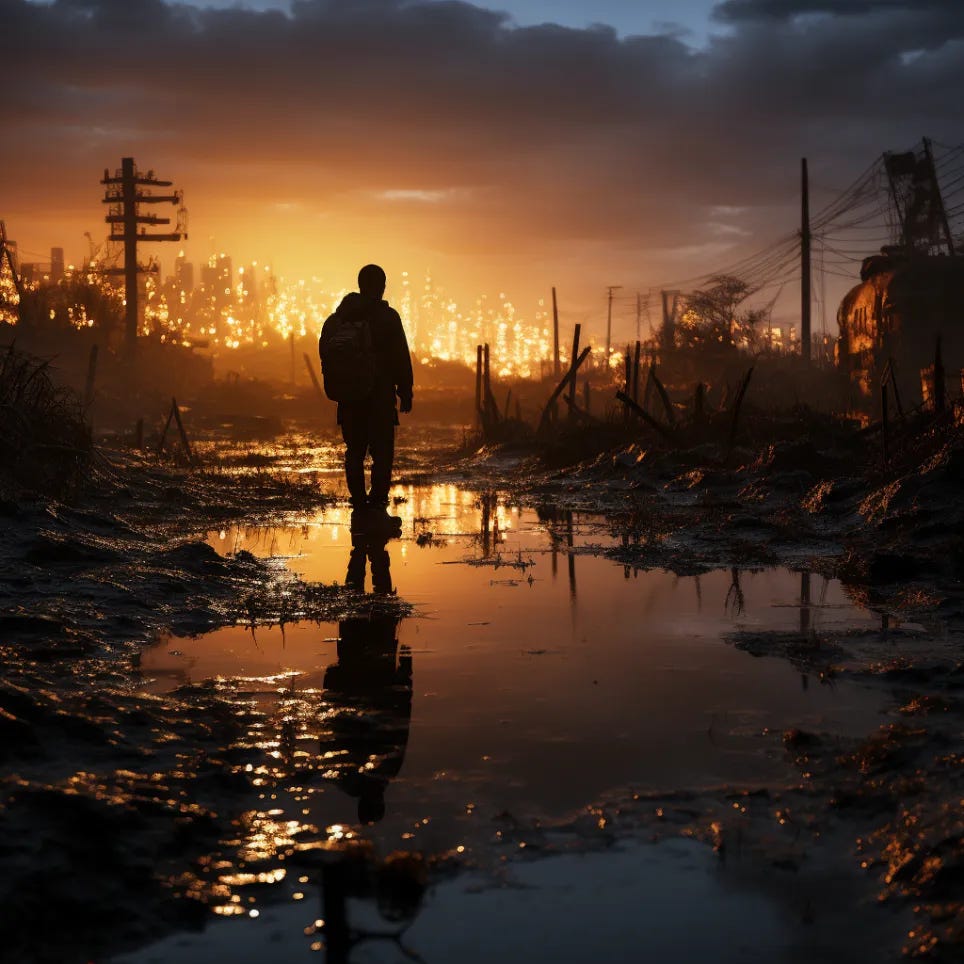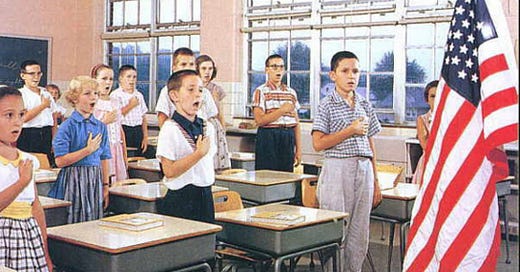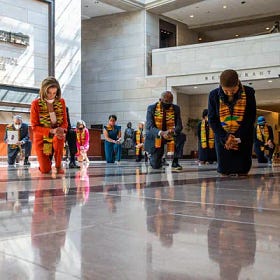Prologue
Babies born between 1932 and 1945, like myself, were conscripted into the Grand Experiment called America at the intersection of global change and national introspection, our formative years shadowed by the aftermath of World War II and marked by the unfolding dramas of the Cold War era. We, swaddlings of the ‘Greatest Generation,’ were infantilized as the ‘'Silent Generation.’ Our formative years were characterized both by burgeoning prosperity and wispy unease.
In the immediate post-war years, American society rode waves of victory and economic boom. The late 1940s and 1950s saw a surge in suburban development, driven by the GI Bill and a booming economy. My generation's early childhood was set against a backdrop of unprecedented American affluence, a stark contrast to the deprivation of the Great Depression and war years our parents and grandparents experienced. The idyllic suburban life, with its emphasis on family values and consumer comfort, significantly influenced our worldview. For us this has not changed; American values are alive and well.
However, the era was not without its challenges and complexities. The Cold War had begun, casting a long shadow of nuclear dread over the world. The threat of conflict with the Soviet Union, a stark ideological and political adversary, permeated American life, instilling a sense of caution and conservatism in the national psyche. Schoolchildren were taught to ‘duck and cover,’ a stark reminder of the nuclear threat that loomed over the globe.
The 1950s were also a time of significant social and cultural shifts. The Civil Rights Movement gained momentum, challenging the status quo of racial segregation and discrimination. Our generation witnessed the early stages of this pivotal movement, observing the Montgomery (Alabama) Bus Boycott, the emergence of Martin Luther King Jr. as a national leader, and the gradual awakening of national consciousness to issues of racial inequality.
Internationally, the Korean War (1950-1953) was another significant event that shaped our worldview. It was the first major conflict of the Cold War, further entrenching the divide between the communist and capitalist worlds. Though younger than the soldiers who fought, we felt the war's impact through family and community connections, reinforcing the global tension they were well acquainted with. I vividly recall the day my mother announced, “MacArthur was fired.” I wondered why someone would shoot MacArthur. I was 7.
Culturally, the 1950s were a time of both conformity and sowing the seeds of rebellion. The era's music, epitomized by the rise of rock and roll and Elvis Presley, began to shape a distinct youth culture. Television became a central part of American life, shaping perceptions and providing a trusted window to a broader world. Everyone watched Ed Sullivan on Sunday nights.
In education, our generation experienced a strong emphasis on science and technology, partly in response to the Soviets' launch of Sputnik in 1957. This event not only launched the space race but also led to a national reevaluation of educational priorities, fostering a focus on science and technological innovation.
The Silent Generation matured into young adulthood amidst the late 1950s and 1960s, a period marked by confusing contrasts. We were shaped by post-war optimism yet shadows of the Cold War loomed large. It was a time when cultural transformation and ripples of social change were beginning to surface. Our childhood was cradled in the arms of prosperity, yet shadowed by pervasive fear, a dichotomy that set the stage for the traditional norms to be questioned and, at times, defied.
While we might not have been as overtly rebellious as the Baby Boomers who succeeded us, our experiences during these pivotal years were instrumental. They laid the groundwork for the societal shifts that would unfold in the latter half of the twentieth century, carving the nation's trajectory and molding this endangered, reality-bereft world. We, the bookends of a bygone era, lament today's world, finding ourselves 'bewitched, bothered, and bewildered' by the transformations we've weathered.
The Doom Loop
Past events often set the stage for the future, a notion encapsulated in the saying 'Past is prologue.' In this vein, the 'Doom Loop’ we find ourselves immersed in today is deeply rooted in the events of the recent past, particularly the year 1963.
My hypothesis, as elaborated in our recent piece on today’s Bizarro World,1 posits that American democracy, once an ineffable beacon of light for the Silent Generation and our forebears, fell prey to the sinister clutches of an autocratic Military Industrial Complex and various intelligence agencies.
This pivotal shift was marked by a 1963 coup d'etat: the assassination of President John F. Kennedy. It was on November 22, 1963, that America, according to my analysis, began its descent into a hellish Doom Loop
The concept of a Doom Loop refers to a destructive cycle where each event or issue exacerbates the next, forming a chain of unfavorable outcomes that perpetuate themselves. It's akin to a feedback loop where negative results breed further negative actions, each reinforcing and intensifying the last. This self-reinforcing cycle is hard to disrupt, often leading to an irreversible decline.
Popularized by author Jim Collins, the term 'Doom Loop' is applicable in diverse fields, from psychology, where detrimental thought patterns perpetuate negative behaviors, to systems theory, where different components of a system contribute cumulatively to its downfall. A hallmark of a Doom Loop is the absence of effective intervention or corrective measures, allowing the cycle of decline to intensify unchecked, spiralling conditions from bad to worse.
There was a time when the United States & its people could safely hide behind two Oceans, a robust economy, a homogenous society (ethnic, cultural & religious), technological prowess, etc. However, none of those are extant today.
~
in The Great Satan & The Last Man2
This quote describes the America of the Silent Generation, an America we took for granted. This is the same America successive generations, particularly Gen Z, have come to hate. What has happened?
The transition from the America known and loved by the Silent Generation to the current and palpable Winter of Discontent, especially pronounced among younger generations like Gen Z, is owing to a complex calculus of factors that collectively resonate with the Doom Loop concept, where systemic challenges interlock and amplify each other.
Central to these challenges is the erosion of spiritual awareness, particularly acute among the younger generations, and the noticeable spiritual complacency of my own generation. This decline in spiritual and self awareness significantly fuels the Doom Loop and inextricably leads to chaos, the entropy of spirituality — a breakdown or decay in spiritual order and structure
Moreover, it undermines social cohesion and moral judgment and corrodes the capacity for self-reflection and empathy. The ramifications of this spiritual void are indeed significant, permeating every facet of societal interaction and contributing to a perpetuation of the cycle of discontent and disconnection.
This spiritual void extends far beyond personal loss; it sends ripples through the very core of our society, eroding the foundation of community and the values we collectively hold dear. The younger generation often perceives traditional spiritual and religious frameworks as archaic notions rather than as guiding forces. This growing detachment from spiritual roots creates a vacuum, one increasingly filled by the allure of the material and transient, sidelining the pursuit of the transcendent and eternal.
Simultaneously, the older generations' complacency towards spirituality — a somewhat inadvertent disregard for the moral and ethical bedrock that shaped their own journey — has inadvertently left the youth adrift, devoid of the spiritual guidance once passed down through generations, a malady further exacerbated by the Globalist Cabal’s relentless assault on mother, father, family and gender.
This generational disconnect is worsened by the overall diminished self-awareness in society. In this narcissistic ‘Cluster B’ era marked by constant stimulation and external validation, the inward journey of self-discovery and reflection becomes a path less traveled, even ridiculed. The relentless pursuit of external success overshadows the quest for inner peace, self-awareness and understanding.
This collective drift away from introspection and spiritual grounding has far reaching implications. It affects our ability to connect deeply with others, to empathize with those beyond our immediate circles, and to navigate life's challenges with resilience and moral clarity.
Restoring these lost dimensions of spiritual and self awareness is not merely a personal endeavor but a societal imperative essential in disrupting the Doom Loop cycle. It becomes a foundational step towards healing other fractures and bridging divides that we face in our personal lives.
Perhaps no institution has failed us more than the Church, and to no greater detriment. It is apparent to those with eyes to see that the Vatican has been captured by the Globalist Cabal, along with most Western democracies. Pope Francis willfully bent the knee to Globalism, a true betrayal of Christianity. For this travesty he (one of many) deserves the moniker of antichrist.
When I further contemplate this Doom Loop’s sequence of events, I always arrive at the same conclusion, one shared with political commentator Ahnaf Ibn Qais: America, and the West at large, have alarmingly morphed into what can be likened to an Orwellian cancer: an Empire of Lies where absurd Newspeak thrives, metastasizing and devouring the very fabric of societal truth and coherence.
Because they refused to love the truth, God will send to them a strong delusion so that they will believe the lies and take pleasure in unrighteousness.
2 Thessalonians 2
Biblical prophecies are unfolding before our very eyes. Would that more had eyes to see!

A Coup d'état, The Big Lie and More Lies Bedevil our Bizarro World
Appropriately, we embark on this journey by beginning at the origin. Perhaps by retracing our steps, by revisiting the foundational moments and decisions that have shaped our path, we can unravel a complex web of lies that has enveloped us and our nation. It is by understanding our past that we awaken to reality, seizing the opportun…








Honored by the mention Good Sir! 😊
You lay it out so clearly. I'm a Baby Boomer (born early '50s), and have witnessed our decline, which in my youth I arrogantly mistook for enlightened progress. Doom Loop indeed. Durkheim's "anomie" also comes to mind.